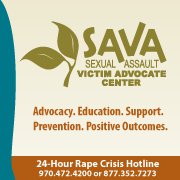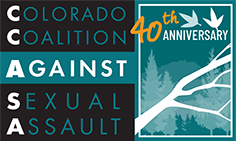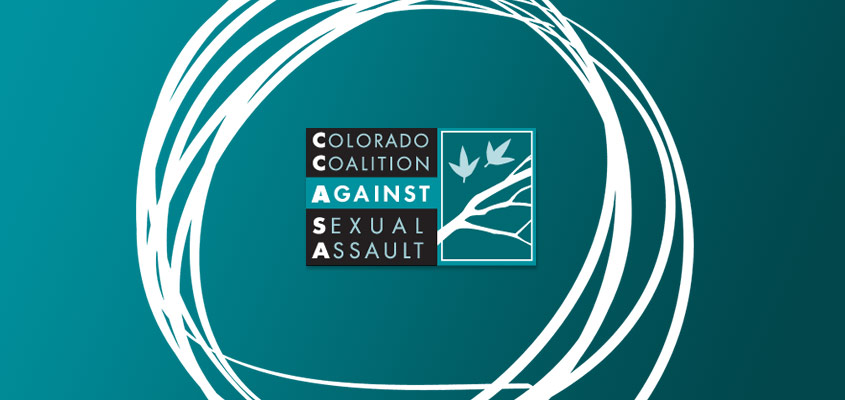By Meghann McCluskey, CCASA Blogger
Approximately 700 people are sexually assaulted in the U.S. each day [1]. For these individuals, the road to healing and justice is often fraught with complications. Research shows that one of the most salient factors in healing from sexual trauma is the presence of a dependable support system, and yet many people who survive sexual assault experience loneliness, isolation, and shame that can impede their healing process. Pamela Wagner hopes to change that.
 Pam – as she prefers to be called – is part of a nationwide network of volunteers who tirelessly devote their free time to operating rape crisis hotlines. These hotline workers provide essential support to survivors in need 24 hours a day, 365 days per year. Pam volunteers for the Sexual Assault and Victim Advocate Center (SAVA) in Fort Collins. SAVA staff members refer to her as a “rock star” volunteer because of her willingness to go above and beyond to help survivors of sexual violence. Pam recently spoke with me via phone to elaborate on her experiences as a hotline volunteer.
Pam – as she prefers to be called – is part of a nationwide network of volunteers who tirelessly devote their free time to operating rape crisis hotlines. These hotline workers provide essential support to survivors in need 24 hours a day, 365 days per year. Pam volunteers for the Sexual Assault and Victim Advocate Center (SAVA) in Fort Collins. SAVA staff members refer to her as a “rock star” volunteer because of her willingness to go above and beyond to help survivors of sexual violence. Pam recently spoke with me via phone to elaborate on her experiences as a hotline volunteer.
Meghann McCluskey (MM): Tell me a little bit about your involvement with SAVA. How long have you been with them, and what kind of volunteer activities are you engaged in?
Pam Wagner (PW): I’ve been working on the hotline for a little over two years. We’re just there for people when they call, whether it’s to listen to them, give them referrals, or sometimes we even go to the hospital with them if they decide that’s what they need. You never know exactly what you’re going to get when someone calls.
MM: What made you decide to become a hotline volunteer?
PW: I’ve always wanted to help this kind of cause, but I always worked unusual hours. Then I decided to quit working and was able to spend a lot more time focusing on this. I was attacked as a teenager, and at the time I didn’t know there was such a thing [as a crisis hotline].
MM: I’m sorry that happened to you.
PW: It makes you stronger.
MM: I can see why you would want to devote so much of your time to helping those in similar situations. About how many shifts do you cover for SAVA each month?
PW: I cover almost every weekend. I’m typically a responder 2 during the night shift, meaning I’m a back-up for responder 1, and then I’m a responder 1 during the day.
MM: Wow – Almost every weekend! What does that do to your social life?
PW: [Laughing]. I really don’t have much of a life outside of this. I’m a homebody. I home school my daughter, so other than that and being on the hotline I don’t have to leave the house very much.
MM: I imagine that answering hotline calls is both a rewarding and challenging experience. Let’s start by talking about some of the rewards.
PW: It’s just the fact that you know you’ve helped somebody get through a tough time. It’s a good feeling to know that you’ve helped somebody through a time in their life when it wasn’t so easy for them. It really makes a difference.
MM: It certainly does. And what are some of the challenges associated with this type of volunteer position?
PW: Occasionally calls will keep me awake, and the hospital calls will go hours and hours.
Going to the hospital can be a little intimidating, but once you’re there and you’re talking to the person, all of that kind of goes away. Sometimes the cops are not so sensitive, so we help [the survivors] with the reporting part if they want to do that. And sometimes even the nurses aren’t so sensitive, so it can really help to have us there with [the survivors]. Other than that stuff, there are also the people who sometimes call who just want to make a dirty phone call or something.
MM: I bet that’s frustrating.
PW: You have to be really careful to give yourself a break every now and then, because you start to feel overwhelmed by everything. It’s also difficult for me to end the phone call. Sometimes people just really need to talk, and it’s hard for me to get off the line with them.
MM: What types of self-care strategies do you employ to take care of yourself after a particularly difficult call?
PW: Usually I’ll call the other volunteer who is working that night to discuss it with them. They’re always good listeners too, so it’s nice to use them for support.
MM: If you could impart some advice for people considering becoming volunteers, what would you tell them?
PW: Be a good listener, and don’t try to interject your own personal experiences into theirs. Just take care of yourself.
MM: Is there anything else I should know about your experience as a hotline volunteer?
PW: It’s completely rewarding.
To learn more about becoming a hotline volunteer, visit the Colorado Coalition Against Sexual Assault (CCASA) website for information about rape crisis centers in your area.
[1] U.S. Department of Justice. National Crime Victimization Survey. 2010

